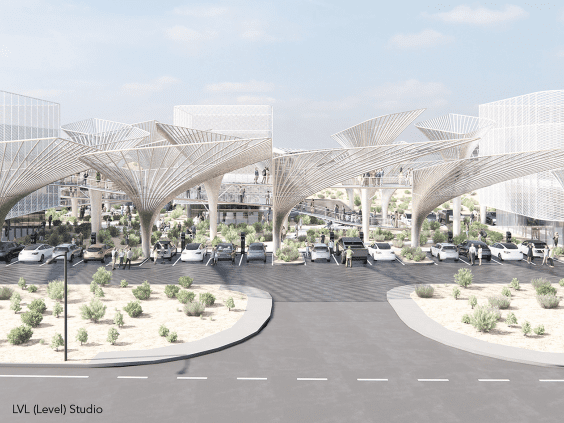EV Charging Infrastructure Concept Wins 2023 Forge Prize

CHICAGO – A concept that would use structural steel to reinvent the gas station experience for the EV age has won the American Institute of Steel Construction’s 2023 Forge Prize.
LVL (Level) Studio collaborators Jeffrey Lee, Christopher Taurasi, and Lexi White won the $10,000 grand prize in a YouTube live stream Thursday afternoon. They worked with Schuff Steel Senior Vice President Christian Crosby to refine their Electric Oasis vision and make the process of bringing it to life in steel more efficient.
The project team will give an encore presentation at Architecture in Steel at NASCC: The Steel Conference in Charlotte, N.C. at 11:30 a.m. on Wednesday, April 12.
The judges were particularly impressed by the team’s thoughtful approach, which turns a banal task into a destination event.
“You’ve taken something very mundane that we give not a second thought to usually and injected a certain level of magic–not just waiting for the charging, but also what you can do with that time,” said Forge Prize Judge Melanie Harris, AIA, LSSYB, NCARB, who is the national healing practice director at BSA LifeStructures. “We’re all looking for efficiencies in our life these days and the last thing we want to do is wait around and do nothing while we wait for our cars to charge.”
The time it takes to recharge is, the team noted, one of the primary differences between a gas and electric vehicle.
“On average, a gas stop takes around seven minutes to refill a tank,” Lee said. “A level-two charging station, which is the most common type, takes upwards of four and a half hours for a full charge. We have an opportunity to reimagine the gas station typology into something that can revitalize the local economy.”
So what to do with that time? In their vision, motorists would relax, work, play, shop, or perhaps even get healthcare while their vehicles charge–all activities that offer new economic opportunities for small communities around highway interchanges.
These charging stations are defined by striking steel canopies that offer shade. In their primary use case, for a site within average EV range of both Los Angeles and San Francisco, a pathway winds through the canopies, offering vistas and an engaging space in a loop that takes about 15 minutes to explore.
The pathway connects buildings that would house retail and other spaces–with photovoltaic panels on the roof, naturally. Those hubs feature a steel scrim that is both beautiful and functional, providing shade that would reduce solar gain by up to three hours a day.
The design takes advantage of steel’s unique modular potential to facilitate economical, rapid erection–and steel’s unique recyclability and circular supply chain add an additional layer of sustainability while reinventing the existing infrastructure.
“This is a vehicular kind of society,” noted Forge Prize Judge Rona Rothenberg, FAIA, DBIA, the 2022 president of AIA California, noting that it’s applicable to a vast number of sites across the country. “This is a great way to reuse what we already have and transform it into a resilient, sustainable and lasting solution.”
What motorists may not see while they’re enjoying the amenities: soil remediation. The design includes a mechanism to clean up any ground contamination left over from the site’s use as a gas station.
LVL (Level) Studio was one of three finalists in the competition.
First runners-up Junior Carbajal and Masamichi Ikeda (both of JRMA Architects Engineers) won praise for their Adaptive Micro Cities design, which would create a self-sustaining virtual community with separate zones where people can live, work, and play all brought together with a series of modular boxes, to revitalize a small island in a Portland, Ore., industrial zone.
The judges were also impressed by the scale of second runner-up Then Le’s (Huntsman Architectural Group) Trans-connect multi-modal transportation hub and its thoughtful plan for everything from high-speed trains to electric airplanes in San Francisco.
High-res photos of all three projects are available here.
The American Institute of Steel Construction’s annual Forge Prize competition celebrates emerging architects who create visionary designs that embrace steel as the primary structural component while exploring ways to increase project speed. Learn more at forgeprize.com.
AISC would like to thank Melanie Harris, Sean Joyner (writer & communications strategist at Perkins & Will), and Rona G. Rothenberg for serving as this year’s Forge Prize judges.
About the American Institute of Steel Construction
The American Institute of Steel Construction, headquartered in Chicago, is a non-partisan, not-for-profit technical institute and trade association established in 1921 to serve the structural steel design community and construction industry. AISC’s mission is to make structural steel the material of choice by being the leader in structural steel-related technical and market-building activities, including specification and code development, research, education, technical assistance, quality certification, standardization, market development, and advocacy. AISC has a long tradition of service to the steel construction industry of providing timely and reliable information.


